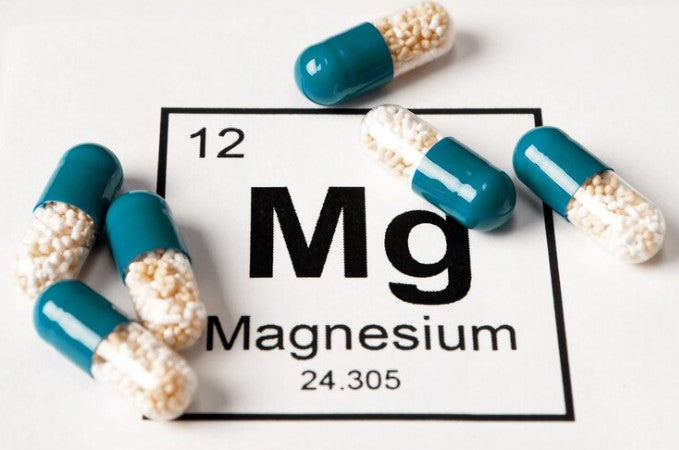
What Magnesium Is Best for Sleep?
If you've been tossing and turning at night, you're not alone. Poor sleep affects nearly 70 million Americans, and while many people reach for melatonin or prescription aids, there's growing interest in magnesium as a natural sleep supporter. But here's what most people don't realize: what magnesium is best for sleep depends entirely on which form you choose.
Your body processes different types of magnesium in completely different ways. Some work primarily on your muscles, others focus on digestion, and one unique form, Magtein® magnesium L-threonate, targets your brain's sleep centers directly.
In this article, we’ll cover the basics and help you understand which form is best for your needs.
How Magnesium Supports Sleep
Magnesium plays several crucial roles in supporting healthy sleep patterns. This essential mineral helps regulate your body's stress response system and supports the production of GABA, a neurotransmitter that promotes relaxation and calm.
When your magnesium levels are optimal, your body can:
- Regulate melatonin production naturally
- Maintain healthy cortisol levels
- Support muscle relaxation
- Calm nervous system activity
- Promote deeper, more restorative sleep phases
The challenge is getting enough bioavailable magnesium to effectively support these processes. This is where choosing the right form becomes key because absorption and delivery to the right body systems make all the difference.
Comparing the Best Magnesium Forms for Sleep
Magnesium Glycinate
Magnesium glycinate combines magnesium with the amino acid glycine. Glycine itself has calming properties, making this combination particularly effective for relaxation.
Benefits:
- Highly bioavailable and gentle on the stomach
- The glycine component adds additional calming effects
- Less likely to cause digestive discomfort
- Good for general muscle relaxation
Best for: People who primarily need help with physical relaxation and falling asleep
Magnesium Citrate
This form combines magnesium with citric acid, creating a supplement that's well-absorbed but can have a mild laxative effect.
Benefits:
- Good bioavailability
- Relatively inexpensive
- May help with both sleep and digestive regularity
Considerations:
- Can cause digestive upset if taken in higher doses
- May not be ideal right before bedtime due to potential bathroom trips
Best for: Those who want sleep support along with digestive benefits
Magnesium Oxide
While common and inexpensive, magnesium oxide has poor bioavailability, meaning much of it passes through your system without being absorbed.
Considerations:
- Low absorption rate (around 10-15%)
- More likely to cause digestive issues
- May not provide consistent sleep benefits
**Not recommended as the best form of magnesium for sleep due to absorption issues
Magnesium L-Threonate (Magtein®)
This is where things get interesting for sleep support. Magnesium threonate for sleep offers a unique approach because it’s specifically formulated to cross the blood-brain barrier.
Benefits:
- Directly increases brain magnesium levels
- Supports the central nervous system's sleep regulation
- May help with both sleep quality and cognitive recovery during rest
- Supports the brain's natural relaxation processes
Best for: People who want comprehensive sleep support that promotes brain health and cognitive recovery
Why Absorption and Brain Penetration Matter
The best magnesium for sleep isn't necessarily the one with the highest elemental magnesium content - it's the one that gets to the right places in your body.
Most magnesium supplements work peripherally, supporting muscle relaxation and general calm throughout the body. While this can certainly help with sleep, Magtein® takes a different approach by specifically targeting the brain's sleep regulation centers.
When magnesium reaches your brain tissue directly, it can:
- Support optimal neurotransmitter function
- Help regulate your body's internal sleep-wake cycle
- Support the brain's natural recovery processes during sleep
- Promote both falling asleep and staying asleep
This targeted approach explains why many Magceutics customers report not just falling asleep more easily, but experiencing more refreshing, restorative sleep.
When to Take Magnesium for Sleep
When you take a magnesium supplement depends entirely on the form you choose and your specific sleep challenges:
General Timing Guidelines:
- 1-2 hours before bedtime: Most effective for sleep support
- 30-60 minutes before bed: If you primarily need help falling asleep
- Earlier in the evening: If you experience digestive sensitivity
Considerations Based on Sleep Challenges:
Trouble Falling Asleep: Take magnesium 1-2 hours before your desired bedtime to allow absorption and initial calming effects.
Trouble Staying Asleep: Take magnesium 2-3 hours before, consider a form like Magtein® that supports brain function throughout the night
Early Morning Waking: Brain-targeted magnesium like Magtein® may help by supporting deeper sleep phases and better sleep cycle regulation.
Consistency is Key
Regardless of which form you choose, taking magnesium consistently at the same time each evening helps establish a routine that supports your body's natural sleep rhythm.
Is Magnesium Safe for Kids' Sleep?
Magnesium for kids' sleep can be beneficial, but requires special consideration. Children have different needs from adults, and proper dosing is crucial.
Signs That May Indicate Sleep-Related Magnesium Needs in Children:
- Difficulty settling down for bedtime
- Restless sleep or frequent night waking
- Physical restlessness or "growing pains"
- Difficulty with focus during the day (often related to poor sleep quality)
Important Considerations:
- Always consult with a pediatrician before starting any supplement
- Child-specific formulations ensure appropriate dosing
- Gummy formats like Magceutics' KiddoCalm make supplementation easier and more enjoyable for children
- Start with lower doses and monitor response
Why Magtein® May Support Better Sleep
Magtein sleep benefits represent a unique approach to natural sleep support. As the original developers of this patented magnesium L-threonate compound, Magceutics has pioneered a form of magnesium that specifically targets brain health, including sleep regulation.
Magtein®'s Brain-Targeting Benefits:
Unlike other magnesium forms that work primarily on muscles and peripheral systems, magnesium threonate for sleep works directly in brain tissue where sleep regulation occurs. This targeted approach may help with:
- Deeper, more restorative sleep phases
- Better sleep consistency night after night
- Improved cognitive recovery during sleep
- Wake up feeling refreshed
Choosing patented Magtein® ensures you're getting:
- The exact formulation used in research studies
- Guaranteed purity and consistency
- Quality standards that meet clinical requirements
- The innovation of the original developers at Magceutics
Research and Customer Experience:
While research into Magtein’s sleep benefits continues to evolve, early studies and customer reports suggest that this brain-targeted approach to magnesium supplementation may offer unique advantages for sleep quality and duration.
Many Magceutics customers report not just falling asleep more easily, but waking up feeling more refreshed and mentally clear, suggesting that the brain-health benefits of Magtein® extend into sleep recovery and restoration.
Finding the best magnesium for sleep is personal. What works best depends on your individual needs, sleep challenges, and how well you absorb different forms.
Whether you choose the muscle-relaxing benefits of magnesium glycinate or the brain-targeting approach of Magtein®, consistency and quality are key to getting the best results.
FAQs About Magnesium and Sleep
Can magnesium help with insomnia?
Magnesium can support better sleep quality by helping regulate stress hormones, supporting neurotransmitter function, and promoting muscle relaxation. While it's not a cure for chronic insomnia, many people find magnesium supplementation helps them fall asleep more easily and sleep more soundly. The key is choosing the right form and using it consistently as part of good sleep hygiene practices.
Is magnesium habit-forming like other sleep aids?
No, magnesium is not habit-forming. Unlike prescription sleep medications or even some over-the-counter sleep aids, magnesium works by supporting your body's natural sleep processes rather than forcing sleep. You can stop taking magnesium without withdrawal effects, though you may notice a return of previous sleep challenges if magnesium deficiency was contributing to them.
How do I know if I need magnesium for sleep?
Consider magnesium if you experience: difficulty falling asleep, restless or light sleep, waking up feeling unrefreshed, muscle tension that interferes with sleep, or high stress levels that impact sleep quality. Since magnesium deficiency is common and often goes undiagnosed, trying a high-quality magnesium supplement for 4-6 weeks can help you decide if it benefits your sleep. Always consult with a healthcare provider if you have chronic sleep issues.


